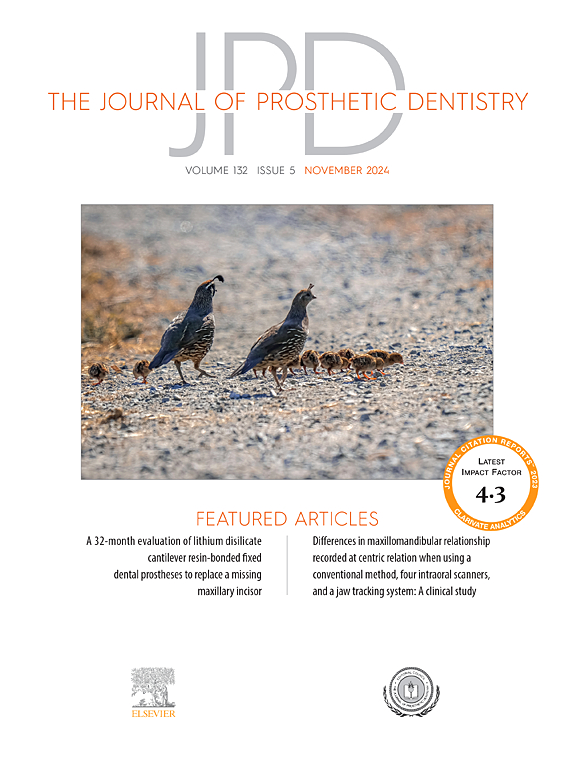牙齿支撑玻璃陶瓷修复体的生物力学考虑:存活率和不可修复失败的系统回顾和荟萃分析。
IF 4.3
2区 医学
Q1 DENTISTRY, ORAL SURGERY & MEDICINE
引用次数: 0
摘要
问题简介:了解玻璃陶瓷的生物力学行为、长期存活率及其潜在的故障对于临床实践中的决策至关重要。目的:本系统综述和荟萃分析的目的是评估各种整体玻璃陶瓷牙科修复体的存活率和不可修复性,以帮助确定生物力学适应症:根据人群、干预、比较和结果(PICO)问题、偏倚风险评估、数据提取、亚组分析和荟萃分析,在 PubMed、Scopus、Web of Science 和 EMBASE 数据库中进行了全面的文献检索。筛选了报告存活率和不可修复失败的随机和非随机临床试验。采用曼特尔-汉斯泽尔法计算风险及 95% 的置信区间:共有 46 篇文章符合纳入标准:8篇文章涉及覆膜贴面,20篇文章涉及部分覆盖修复,11篇文章涉及单冠,6篇文章涉及固定部分义齿,共有1715名参与者接受了4209次修复。在平均 6.2 年的时间里,部分覆盖修复体的累积存活率估计为 90%,不可修复的失败率为 5.9%。层压贴面在 6.5 年内的存活率为 90.2%,不可修复的失败率为 8.2%。单冠在 4.6 年中的存活率为 96%,不可修复的失败率为 2.7%。相反,固定局部义齿在 6.5 年内的存活率为 76.1%,不可修复的失败率为 5.2%:玻璃陶瓷材料的存活率相对较高,这表明它们为部分覆盖修复、覆膜贴面和单冠提供了安全可靠的选择。然而,固定局部义齿不可修复的失败比例较高,存活率较低,因此需要谨慎对待。本文章由计算机程序翻译,如有差异,请以英文原文为准。
Biomechanical consideration in tooth-supported glass-ceramic restorations: A systematic review and meta-analysis of survival rates and irreparable failures
Statement of problem
Knowledge on the biomechanical behavior of glass-ceramics, their survival rate over time, and their potential failures is essential for decision-making in clinical practice. Systematic reviews and meta-analysis of their survival rates and irreparable failures are lacking.
Purpose
The purpose of this systematic review and meta-analysis was to evaluate the survival rates and irreparable failures of various monolithic glass-ceramic dental restorations to help determine biomechanical indications.
Material and methods
A comprehensive literature search was conducted across the PubMed, Scopus, Web of Science, and EMBASE databases based on the population, intervention, comparison, and outcome (PICO) question, risk of bias assessment, data extraction, subgroup analysis, and meta-analysis. Both randomized and nonrandomized clinical trials that reported survival rate and irreparable failure were screened. The risk, with a 95% confidence interval, was calculated by using the Mantel-Haenszel method.
Results
A total of 46 articles met the inclusion criteria: 8 for laminate veneers, 20 for partial coverage restorations, 11 for single crowns, and 6 for fixed partial dentures, encompassing 1715 participants rehabilitated with 4209 restorations. The estimated cumulative survival rate for partial coverage restorations was 90% over an average span of 6.2 years, with an irreparable failure occurrence of n=5.9. Laminate veneers had a survival rate of 90.2% over 6.5 years, with an irreparable failure occurrence of n=8.2. Single crowns had a survival rate of 96% over 4.6 years and an irreparable failure of n=2.7. Conversely, fixed partial dentures had a survival rate of 76.1% over 6.5 years with an irreparable failure of n=5.2.
Conclusions
Glass-ceramic materials demonstrate relatively high survival rates, indicating that they provide a safe and reliable option for partial coverage restorations, laminate veneers, and single crowns. However, fixed partial dentures had a higher proportion of irreparable failures and a lower survival rate, and caution is required.
求助全文
通过发布文献求助,成功后即可免费获取论文全文。
去求助
来源期刊

Journal of Prosthetic Dentistry
医学-牙科与口腔外科
CiteScore
7.00
自引率
13.00%
发文量
599
审稿时长
69 days
期刊介绍:
The Journal of Prosthetic Dentistry is the leading professional journal devoted exclusively to prosthetic and restorative dentistry. The Journal is the official publication for 24 leading U.S. international prosthodontic organizations. The monthly publication features timely, original peer-reviewed articles on the newest techniques, dental materials, and research findings. The Journal serves prosthodontists and dentists in advanced practice, and features color photos that illustrate many step-by-step procedures. The Journal of Prosthetic Dentistry is included in Index Medicus and CINAHL.
 求助内容:
求助内容: 应助结果提醒方式:
应助结果提醒方式:


